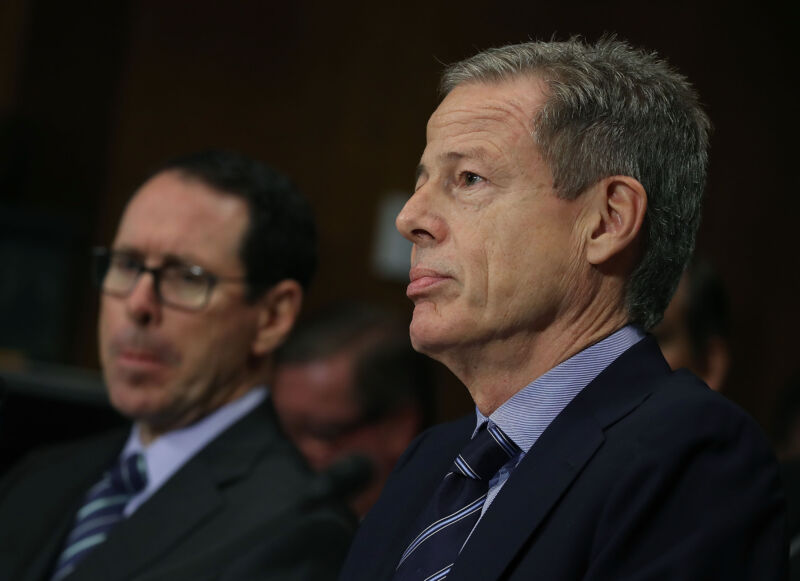AT&T refused to “listen to anybody” at Time Warner after buying it, ex-CEO says

Former Time Warner CEO Jeff Bewkes says that he and other board members were surprised that AT&T mismanaged the media company after buying it in 2018. Bewkes is quoted about the aftermath of the $108 billion merger in a James Andrew Miller book called Tinderbox: HBO’s Ruthless Pursuit of New Frontiers, which will be released on November 23.
The Wall Street Journal received an advance copy of the book and published an article today describing Bewkes’ comments:
While Mr. Bewkes doesn’t express regret over the decision to sell to AT&T, he said he is angry about how his team of top executives and the staff were treated.
Among the high-profile departures were HBO’s former boss, Richard Plepler. Mr. Plepler left after clashes over strategy with John Stankey, who was tapped to run the entity—rebranded as WarnerMedia—and now is chief executive of AT&T.
“The most disappointing thing to me about the AT&T merger,” Mr. Bewkes is quoted in the book as saying, is that he and his board thought AT&T “would basically leave our people alone.” That didn’t happen, he said. “We didn’t think they would go to such a level of malpractice as to not listen to anybody… even though they themselves had no experience in those areas.”
Bewkes suggested merger with AT&T
Bewkes was Time Warner CEO from 2008 to 2018 and was previously the CEO of HBO. He apparently proposed the sale to AT&T several years before it happened.
“Mr. Bewkes first planted the seed of a sale of Time Warner to AT&T in 2014, as he was looking to fend off Rupert Murdoch’s 21st Century Fox’s takeover attempt,” the WSJ article said. At the time, “Mr. Bewkes bumped into Randall Stephenson, AT&T’s then-chief executive, at the Allen & Co. conference in Sun Valley, Idaho, and told him, ‘our conversation ought to be with you’ instead of Rupert Murdoch, Fox’s then-chief. Mr. Stephenson replied, ‘hold that thought… maybe one day we’ll talk.'”
The Journal article said that “Bewkes confirmed the accuracy of his quotes in the book” and that AT&T representatives confirmed the accuracy of quotes attributed to Stankey and Stephenson. Stankey took over as AT&T CEO when Stephenson retired in mid-2020.
AT&T completed its acquisition of Time Warner in June 2018 after defeating a Department of Justice lawsuit that tried to block the deal. Bewkes left the top post at the same time, collecting an exit package reportedly worth nearly $98 million. Bewkes “agreed to remain with the company as a senior advisor during a transition period,” an AT&T press release at the time noted. His quotes about AT&T’s mismanagement of Time Warner seem to refer to that transition period.
Shortly after AT&T assumed ownership of Time Warner, Stankey told HBO employees at a town hall-style meeting that the network wasn’t making enough money and needed to produce more shows. Plepler resigned in February 2019 amid reports that he was frustrated about having less autonomy to run HBO under AT&T’s ownership.
AT&T spinning-off Time Warner division in 2022
AT&T in May 2021 announced a plan to spin-off WarnerMedia into a new company only three years after buying Time Warner. AT&T struck a deal with Discovery, Inc. to combine WarnerMedia’s and Discovery’s assets into a “standalone global entertainment company” and said the transaction would close in mid-2022. With AT&T having also spun-off DirecTV into a subsidiary, the telecom company will focus on what it probably should have prioritized all along: broadband.
AT&T eliminated tens of thousands of jobs across its media and telecom divisions after the Time Warner merger. AT&T had 273,210 employees immediately after buying Time Warner in mid-2018 and 226,840 as of June 30, 2021. The AT&T employee count dropped to 214,840 after the DirecTV spinoff was completed in August.
Despite giving up on Time Warner, Stankey defended AT&T’s stewardship of the company. “If you are in an acquisition and somebody pays a premium for your stock, by definition it means something has to change,” Stankey is quoted as saying in Miller’s book, according to the WSJ. “If you paid a premium for an operation and you continue to operate it exactly the same way, you never pay back the premium.”
Stankey also said that “he still believes in the vision behind AT&T’s purchase” but that he made the spinoff deal with Discovery in part because investors “refused to give us credit for [the] progress” made with Time Warner. “One of the jobs I need to do in carrying AT&T forward is ensuring we come up with a strategy that the investor base will tolerate and work through and give us the right credit for,” Stankey said.
https://arstechnica.com/?p=1813098